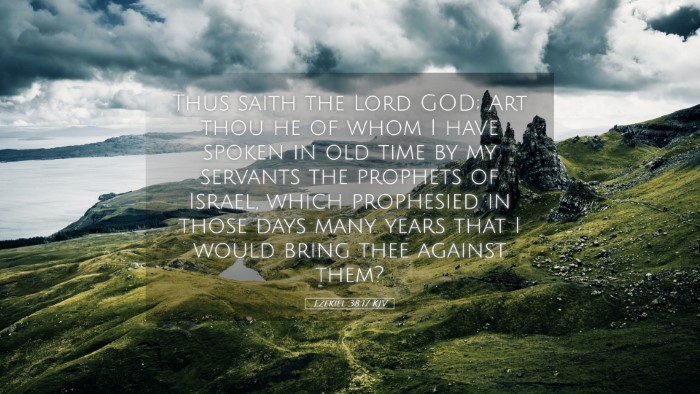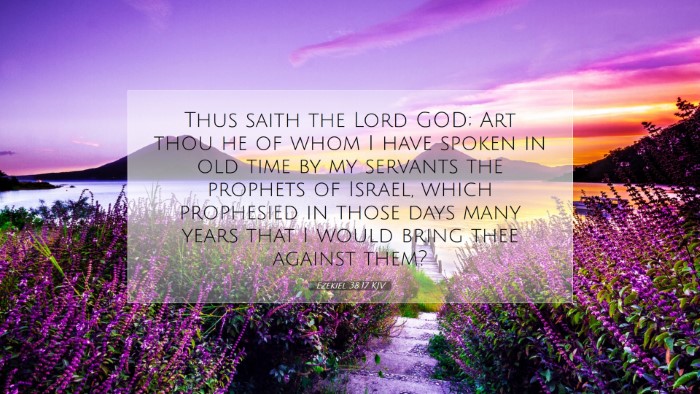Ezekiel 38:17 Commentary
Verse Context: Ezekiel 38:17 reads, "Are you the one of whom I spoke in former days by my servants the prophets of Israel, who prophesied for years in those days that I would bring you against them?" This verse is situated within a larger prophetic oracle concerning Gog, the leader of Magog, and a coalition of nations that would rise against Israel in the latter days.
Interpretative Overview
This verse addresses a climactic moment in the prophetic narrative, where Ezekiel links past prophecies with contemporary events. The question posed seems to address Gog directly, affirming the continuity of God's sovereign plan through history.
Theological Implications
- Divine Sovereignty: This verse illustrates the overarching theme of God's control over history. Throughout scripture, God is depicted as sovereign, orchestrating events in accordance with His divine purpose.
- Prophetic Fulfillment: The reference to prior prophecies indicates that God's intentions and declarations through His prophets are fulfilled in the future, reinforcing the authenticity and reliability of prophetic utterances.
- Historical Continuity: The mention of prophecies in the past suggests that history is not random but can be interpreted through the lens of divine revelation.
Commentary Insights
Matthew Henry
Matthew Henry emphasizes that Ezekiel's rhetorical questions point towards the grandeur of God's revelation. He notes that the mention of past prophets underscores the fact that God has long been aware of the future challenges Jerusalem would face. Henry sees Gog as not merely an individual but rather a typological representation of all oppositional forces against the people of God.
Albert Barnes
Barnes addresses the historical and eschatological aspects of this verse, asserting that the prophecies regarding Gog were made in the context of the promised restoration of Israel. He highlights that God's declaration serves to remind Israel that the events they are witnessing were foretold, which offers them assurance of God's ultimate plan for their salvation.
Adam Clarke
Clarke elaborates on the question posed within the verse, interpreting it as a confirmation of prophetic authority. He asserts that it reinforces God's communication through prophets as a means of preparing His people for impending conflicts. Clarke focuses on the imagery of the final battle, drawing parallels to other biblical prophetic literature concerning the end of days.
Practical Applications
For pastors and theological students, the exploration of Ezekiel 38:17 reminds us of the importance of historical context in understanding prophetic scripture. It invites consideration of the ways in which God has consistently communicated His plans and emphasizes the need for preparedness in the face of spiritual opposition.
Moreover, as scholars examine this verse, it provides a rich framework for understanding the eschatological themes prevalent in both the Old and New Testaments. The assurance of divine sovereignty in historical events offers comfort and encouragement to believers in times of uncertainty.
Conclusion
In Ezekiel 38:17, the prophet frames a profound theological truth: God's purposes are established in and through history, articulated by His chosen prophets. As we engage with this text, may we embrace its implications for faith, understanding the unfolding of God’s redemptive history while being assured of His continuous sovereign rule.


